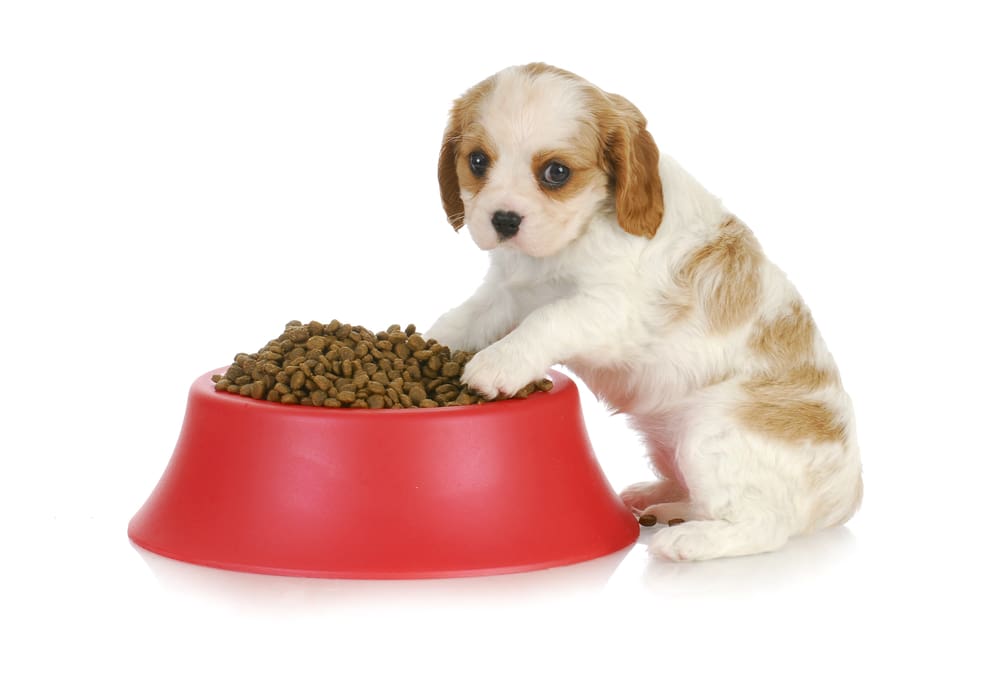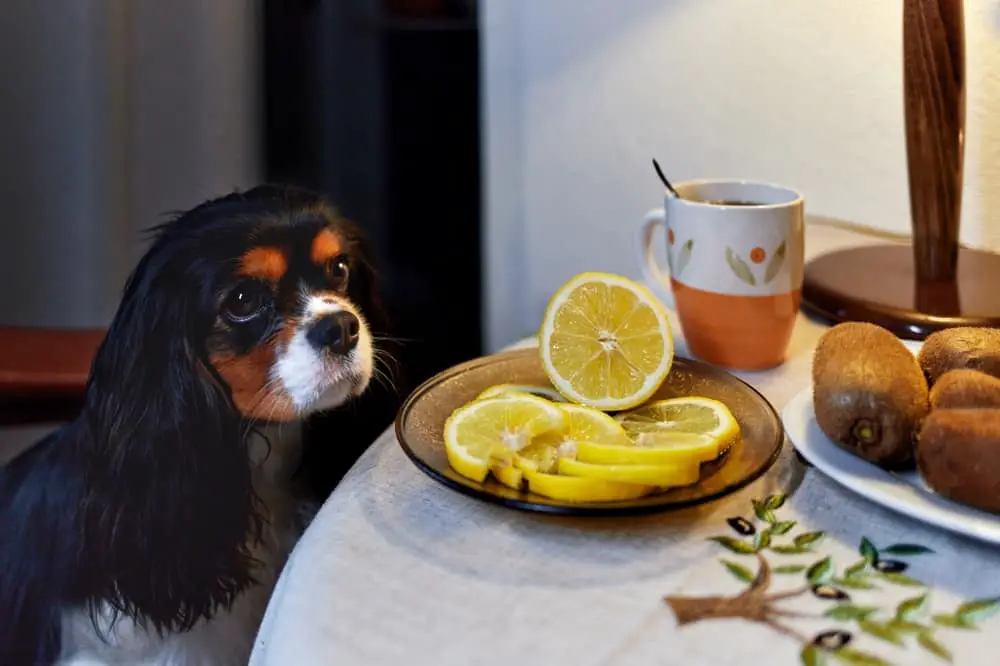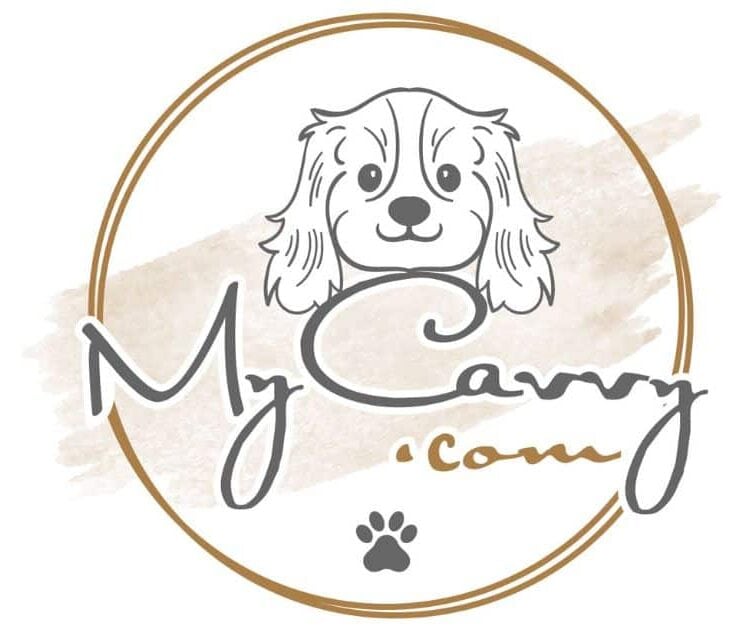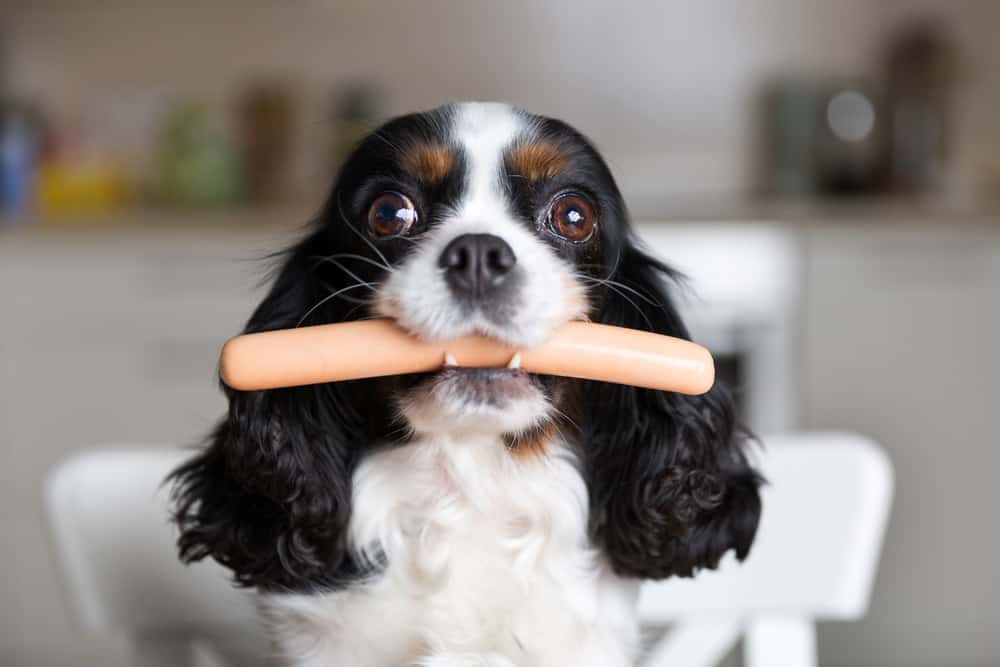Cavalier King Charles Spaniel puppies are adorable. I remember when we became Cavvy parents, it was a magical time. It’s also quite scary because you want the best for your puppy.
There are so many products out there to keep them entertained and to prevent them from chewing the furniture and food, there are so many different brands and types, and this begs the question, ‘What Should I Feed My Cavalier Puppy?’
During your Cavalier King Charles Spaniel puppy’s initial months, they will require a balanced diet containing protein, fat, carbohydrates, and essential vitamins and minerals.
It’s crucial to choose a high-quality dog food specifically tailored to their needs. In general, puppies between 2-3 months old should consume between 117 and 190 calories per day, with around 22% of that intake being protein and 8% fat.
There are various food options for your Cavalier King Charles Spaniel, such as dry kibble, wet or canned food, and even raw food.
Each option has pros and cons, but the key is to select a food that provides the right balance of nutrients suitable for your puppy’s age, size, and activity level. Remember to consult your veterinarian for personalized guidance on your growing pup’s ideal feeding plan and schedule.
Cavalier Puppy Nutrition
Importance of a Balanced Diet
Like all puppies, Cavaliers require a balanced diet to support their growth and development. Protein is essential for building and maintaining strong muscles, while carbohydrates provide energy for your puppy’s daily activities.
Healthy fats support the development of the nervous system and improve the texture of your puppy’s coat. Vitamins and minerals are vital in many metabolic processes, including immune function, bone development, and cellular repair.
A diet lacking these key nutrients can lead to various health issues.
Age-Specific Nutritional Needs
A Cavalier King Charles Spaniel puppy’s nutritional needs vary depending on age.
3-6 months:
- Daily calories: 176 – 244 kcal
- Protein: 22%
- Fat: 8%
Your puppy needs a 22% protein and 8% fat diet during this stage. This helps support their rapid growth and development.
6-12 months:
- Daily calories: 208 – 375 kcal
- Protein: 22%
- Fat: 8%
Once your Cavalier turns six months old, their daily food intake should increase to 208-375 kcal while maintaining the same protein and fat percentages.
Choosing a diet with high-quality animal-based protein sources is important for your Cavalier King Charles Spaniel. Some examples include beef, chicken, turkey, lamb, duck, eggs, and fish.
A balanced diet for a Cavalier King Charles Spaniel puppy should consider their health status, activity level, size, breed-specific needs, and weight.
If you are making homemade dog food, it is common to lack one or more of these nutrients. It’s easily done, don’t beat yourself up about it. So to aid their diet, you could use a multivitamin supplement to help your Cavalier get a balanced diet.
Choosing the Right Dog Food
Commercial Dog Food Options
Various commercial dog food options are available for feeding your Cavalier King Charles Spaniel puppy.
These include dry food (kibble) and wet food (canned). Both types have their advantages and disadvantages. Dry food tends to be more convenient and cost-effective, while wet food can be more palatable and easier to chew for some puppies.
When selecting dog food, look for one specifically formulated for puppies, as their nutritional requirements differ from those of adult dogs.
Research and Reviews
Before deciding on the best dog food for your Cavalier King Charles Spaniel puppy, conducting thorough research and reading food reviews from reputable sources is crucial.
Reading dog food labels and understanding the ingredients is essential to ensure that the food provides the necessary nutrients for a growing puppy. Key nutrients to look for in puppy food include:
- Adequate levels of protein (around 22%)
- Fat content (around 8%)
- Calories (between 176 and 244 calories per day for puppies aged 3-6 months)
Also, consider any potential preservatives used in the product. Some preservatives, like ethoxyquin and propylene glycol, are potentially harmful and should be avoided. Select a dog food brand that uses natural preservatives such as tocopherols and ascorbic acid.
With new research and food types changing frequently, keeping up with what commercial food is ideal for your pup is hard. So I always advise a consultation with your veterinarian on the best food options for your puppy.
They may have specific recommendations based on your puppy’s age, size, and overall health.
With expert advice and careful research, you can make an informed decision and provide your puppy with the best nutrition possible.

Feeding Schedule and Portions
Determining Activity Level
When feeding your puppy, it’s important to consider their activity level. Active puppies require more calories and nutrients to support their growth and energy needs.
On the other hand, less active puppies do not need as many calories, so adjust their portions accordingly to prevent obesity.
Here are some guidelines for kibble to help you determine the right amount of food to feed your puppy based on their activity level:
- High activity: 1.5 to 2 cups of dry dog food daily
- Moderate activity: 1 to 1.5 cups of dry dog food daily
- Low activity: 0.75 to 1 cup of dry dog food daily
Remember that these measurements are approximate and should be customized for your puppy’s specific needs.
Different dogs come in different shapes and sizes, requiring different amounts of food and exercise. So it’s best to consult your vet or nutrition expert to ensure you’re providing the right nutrients for your puppy.
Adjusting for Growth and Age
As your puppy grows and develops, their nutritional needs will change. It’s crucial to adjust their feeding schedule and portions to support their growth.
Here is a general guideline for feeding your Cavalier puppy at different stages of its development:
- Under four months: 4 meals per day (4 hours apart)
- Four months to 1 year: 3 meals per day (5-6 hours apart)
- Eight months: 1.5 cups of dry dog food daily, split into 2-3 meals
If you are confused about where to start, then take a look at this food calculator for Cavalier King Charles Spaniels.
As your Cavalier King Charles Spaniel transitions from a puppy to an adult, their food intake should lean towards 90% dog food while maintaining a balance between their activity level and nutritional needs. Monitor your puppy’s growth and consult with your vet to adjust their feeding schedule and portions.
Keep track of your puppy’s weight and body condition to ensure they develop healthily. If you notice any signs of obesity or excess fat, consult your vet to address the issue and adjust their diet and activity level.
Some veterinarian practices hold free health clinics for puppies to help them grow into strong, healthy adults. These offer great advice, and as a bonus, you get to meet like-minded people, and puppies surround you (it’s like being in heaven)

Considering a Raw Food Diet
Health Benefits
Feeding your Cavalier King Charles Spaniel puppy a raw food diet can have various health benefits. A raw diet mainly consists of raw meat, organ meats, and bones, along with some vegetables and fruits.
This type of diet is believed to closely resemble the natural diet of wild canines and provide optimal nutrition. Some of the potential health benefits of a raw food diet for your puppy include:
- Improved coat condition: The increased levels of essential fatty acids in raw food can lead to a shinier, healthier-looking coat.
- Better dental health: Chewing on raw bones can help remove tartar buildup and promote stronger teeth and gums.
- Increased energy levels: A diet rich in protein, fats, and essential nutrients can increase energy levels and overall vitality.
- Enhanced immune system function: Raw food provides naturally occurring antioxidants, vitamins, and minerals that help support your puppy’s immune system.
Preparing Raw Meals
When preparing raw meals for your Cavalier pup, ensuring the diet is well-balanced and contains the appropriate amounts of protein, fat, and other nutrients is essential.
Here are some guidelines for creating raw meals for your puppy:
- Protein sources: Include a variety of high-quality meats, such as chicken, beef, or turkey. Organs such as liver and kidney are also recommended for their high nutritional value.
- Fatty acids and omegas: Some meats like bacon can be included in moderation for their essential fatty acids. However, using a low salt content and minimizing bacon to the occasional treat is crucial, as it can contribute to obesity and other health concerns.
- Bones: Raw bones (never cooked bones) are essential to a raw food diet, as they provide necessary minerals and help with dental health.
- Vegetables and fruits: Incorporate small amounts of vegetables, herbs, and berries for carbohydrates, vitamins, and minerals.
- Hydration: Ensure your puppy can access fresh drinking water and include moisture-rich foods to help digestion.
Be cautious with raw foods. After I consulted with a canine nutrition expert, he informed me that not all dogs are suited to a raw food diet as they may have a sensitive stomach or some other medical issue that would mean they are not suited to it.
So if you are in any doubt, ask the experts first.
Supplements for Your Cavalier Puppy
If you are making homemade foods, or you have a fussy eater on your hands, your Cavalier puppy may benefit from certain supplements to support their overall health and development. Fish Oil and Multivitamins are the main supplements of choice.
Fish Oil
Fish oil is a popular dog supplement due to its high omega fatty acid content. These fatty acids benefit brain development, vision, skin, and coat health.
They’re especially important for Cavalier puppies as they grow and mature. Some key points to consider when adding fish oil to your puppy’s diet include:
- Look for a high-quality fish oil supplement specifically designed for dogs.
- Ensure it’s free of artificial additives, preservatives, or potential allergens.
- Follow the dosing guidelines provided by the manufacturer, typically based on your puppy’s size and weight.
Multivitamins
A well-rounded multivitamin supplement can help ensure your Cavalier puppy gets all the essential micronutrients needed for optimal health.
These include vitamins A, B, C, D, E, and K and minerals like calcium, phosphorus, sodium, potassium, and magnesium. When choosing a multivitamin for your puppy, keep the following tips in mind:
- Opt for a veterinarian-recommended brand, ideally one that’s specifically formulated for puppies.
- Look for a supplement that includes a balanced blend of essential vitamins and minerals.
- Always follow the manufacturer’s dosing instructions to avoid over- or under-supplementation.
Cavalier puppies require a balanced diet to support their growth and development. Adding fish oil and a multivitamin supplement will provide essential nutrients that can help promote overall health and well-being for your pup.
Incorporating Fruits and Vegetables
Fruits to Include
Feeding your Cavalier King Charles Spaniel puppy a balanced diet is essential for their growth and overall health.
Including fruits in their diet can provide additional vitamins and nutrients to support their development.
Apples are one example of a fruit that can be safely fed to your puppy. They are a great source of vitamins A and C and can provide dietary fiber essential for digestive health.
However, make sure to remove the seeds and core, as apple seeds contain a small amount of cyanide, which can harm dogs.
Blueberries are another great choice for your puppy’s diet. Not only are they rich in antioxidants, but they also deliver several essential vitamins and minerals. Consider offering these as a healthy snack or a topping on their regular food.
Bananas are another fruit you may want to incorporate into your Cavalier King Charles Spaniel’s diet due to their potassium content, which aids in maintaining healthy muscles and nerves.
Before our Cavvy, Lady, was diagnosed as diabetic, she used to like the taste of bananas but didn’t like the texture. Watching her constantly spit out and then try to eat a small slice of banana was quite comical.
Veggies for Healthier Puppies
In addition to fruits, vegetables can offer essential nutrients to keep your puppy healthy and energetic. Including vegetables in their diet can be beneficial because they provide essential vitamins, minerals, and fiber.
Carrots and sweet potatoes are excellent choices, as they’re high in vitamin A and fiber, contributing to healthy skin, coat, and immune system. You can serve these cooked or raw, but ensure the portions are small and suitable for their size.
Also, be advised that they contain a large amount of natural sugars, so keeping the portion size to a minimum is the best option.
Green beans and peas are packed with essential nutrients like protein, fiber, and vitamins, making them great options for your puppy’s diet. These veggies can be added to their regular food, offering additional taste and nutrition.
Remember to consider portion sizes and frequency, as overfeeding can lead to weight gain and other health issues.
Also, ensure to avoid fruits like grapes, and avocados, which can be harmful to dogs. You can read this article to learn more about toxic foods and their effects.

Addressing Special Health Concerns
Food Allergies and Sensitivities
Cavalier King Charles Spaniel puppies may experience food allergies or sensitivities that can lead to issues like skin allergies and inflammation. Identifying and eliminating the allergens from their diet can significantly improve their health and comfort. Common allergens in dog food include:
- Beef
- Chicken
- Dairy
- Wheat
- Corn
If your puppy shows symptoms of food allergies or sensitivities, immediately stop giving them the food you are suspicious of and speak to your veterinarian to identify the specific allergen and adjust their diet accordingly.
Dental and Bone Health
Cavalier King Charles Spaniels are prone to dental problems and orthopedic issues like hip dysplasia and luxating patella. To support dental health and strong bones in your puppy, focus on the following:
- High-quality diet: Feed your puppy a balanced diet with appropriate amounts of protein, carbs, fats, minerals, and vitamins. A nutritious diet contributes to your puppy’s overall dental and bone health.
- Portion control: Overfeeding can lead to obesity, worsening orthopedic problems. Maintain an appropriate calorie intake, with 90% of their diet from food and 10% from treats.
- Teeth maintenance: Regularly clean your puppy’s teeth to avoid dental issues. Dental chews can also help keep their teeth clean and healthy.
- Supplements: Supplements like glucosamine and vitamin C can help support joint health and minimize orthopedic problems. Talk to your veterinarian about the right supplements for your puppy.
Maintaining proper dental and bone health becomes even more critical as your Cavalier King Charles Spaniel puppy grows into a senior.
You may need to switch to a low-fat or low-calorie diet to help avoid obesity and its associated health risks. Your vet will guide you on the best diet and care for your aging Cavalier.
Tips for Feeding on a Budget
It’s getting harder to afford things nowadays. Almost everyone is on a budget, so here are some tips to help you save money without sacrificing the quality of your puppy’s diet.
Choose dry food (kibble) over canned food:
Dry food tends to be more cost-effective than canned food. Canned food contains a lot of water, which you are paying for.
This water can be easily replaced through their drinking water. So switch to dry food to save money, and ensure your puppy has access to fresh water throughout the day.
Purchase in bulk:
Buying puppy food in larger quantities can be more economical. Look for sales, discounts, or coupons, and consider buying food in bulk if it’s within your budget.
Avoid foods with high water content:
Foods with high water content may seem cost-effective, but some of them can contain fewer nutrients than dry food.
Avoid overfeeding:
Feeding your puppy in moderation helps keep them healthy and at an ideal weight and saves money on food. Overfeeding can lead to excessive weight gain, making your puppy more prone to health issues.
Also, if your pup is at a healthy weight, this will reduce the trips to the veterinarian, which can be costly.
Gradually wean off milk:
After the first 2 to 3 months of life, your Cavalier should be weaned off milk and switched to solid food. This helps reduce the expense of purchasing supplemental milk or milk replacements.

